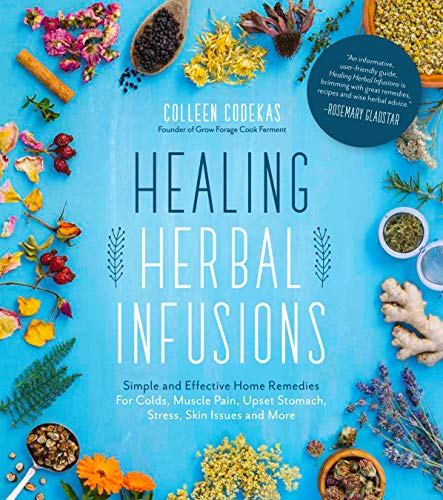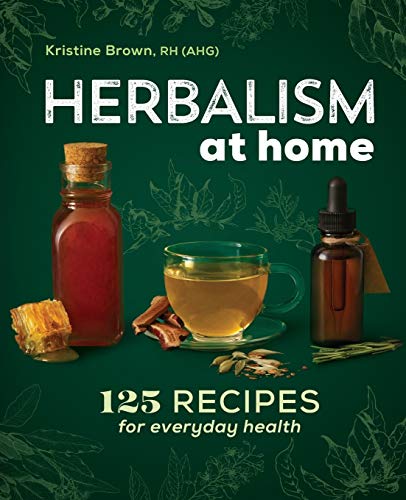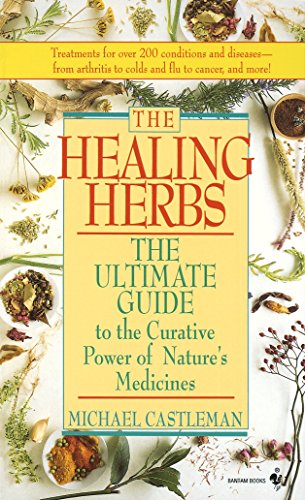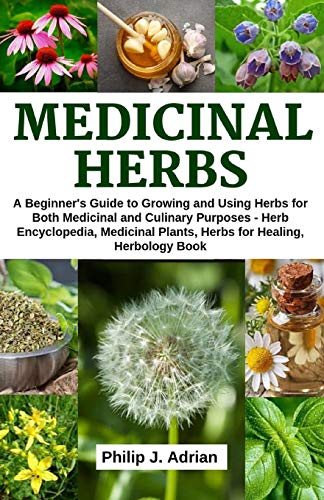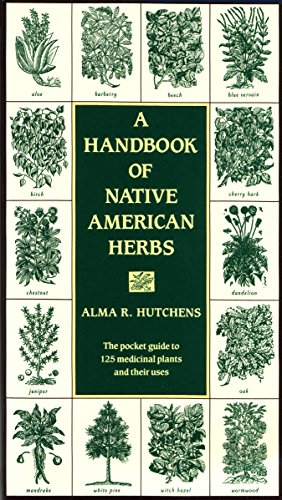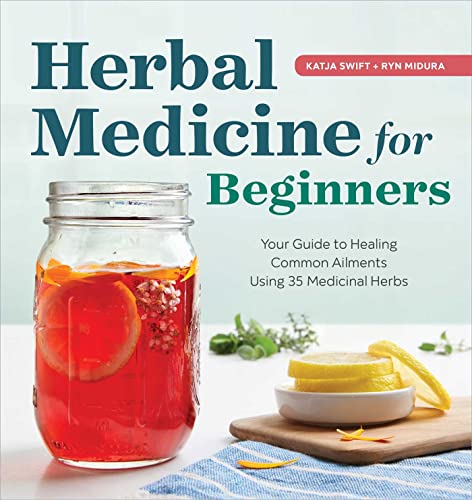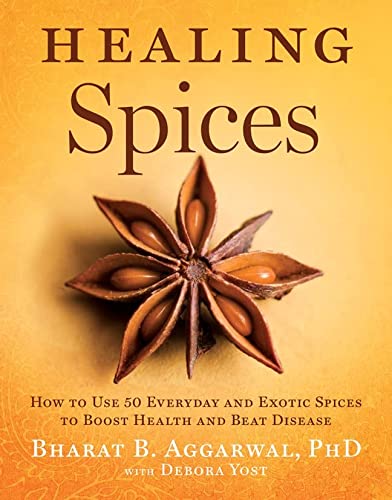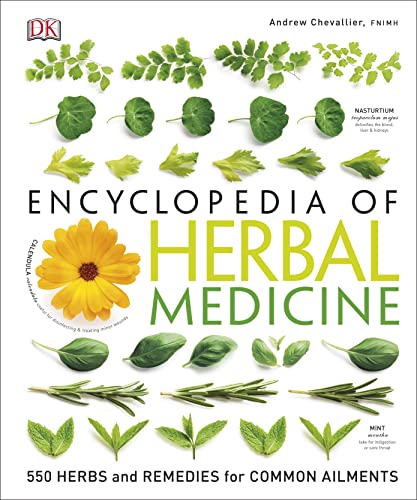Best Herbs For Skin Healing (2024 Update)
Healthy, radiant skin is something we all strive for. While there are many products on the market that promise flawless skin, sometimes the best solutions come from natural sources. Certain herbs contain powerful properties that can promote skin healing, restore vitality, and give you that coveted glow. As you search for the perfect skin-healing herbs, here are a few key factors to consider:
What skin conditions do you want to target? Are you looking to soothe irritation, combat acne, reduce signs of aging, or simply hydrate and nourish your skin? Make sure to choose herbs known to address your specific needs.
How and when will you use the herbs? Some are best consumed as teas, while others work well in topical creams or masks. Consider your lifestyle and preferences. Will you enjoy sipping herbal tea daily or does a weekly face mask sound more appealing?
Are you looking for a single herb or a synergistic blend? Certain herbs work better together. For example, calendula and chamomile are often combined to soothe sensitive skin. Do your research to find winning combinations.
Have you used herbs before? Start slowly with gentle options if you’re new to herbal remedies. Look for herbs appropriate for your skin type. Avoid potential irritants.
The good news is there are many wonderful herbal options for uplifting your skin naturally. A little knowledge goes a long way in choosing the perfect botanicals for your complexion. Are you ready to unlock the beautifying potential of herbs? Discover more about these gifts from nature and how they can transform your skin.
10 Best Herbs For Skin Healing
| # | Product Image | Product Name | Product Notes | Check Price |
|---|---|---|---|---|
|
1
|
The product is ideal for finding drug-free remedies using vitamins, minerals, herbs, and food supplements.
|
|
||
|
2
|
Ideal for beginners interested in learning about and using healing herbs.
|
|
||
|
3
|
The product is ideal for individuals seeking natural remedies for common health issues such as colds, muscle pain, upset stomach, stress, and skin issues.
|
|
||
|
4
|
It is ideal for individuals looking to make their own herbal remedies for common health issues using natural ingredients.
|
|
||
|
5
|
The product is ideal for individuals seeking comprehensive information on natural medicinal herbs.
|
|
||
|
6
|
The product is ideal for those who want to learn how to grow and use herbs for medicinal and culinary purposes.
|
|
||
|
7
|
Ideal for individuals learning about and utilizing native American herbs for medicinal and healing purposes.
|
|
||
|
8
|
This product is ideal for beginners looking to learn about healing common ailments using a variety of medicinal herbs.
|
|
||
|
9
|
This product is ideal for those looking to improve their health and prevent or combat diseases through the use of spices.
|
|
||
|
10
|
The product is ideal for individuals seeking natural remedies and information on herbs to address common health concerns.
|
|
1. Nutritional Healing A-To-Z: The Complete Guide.
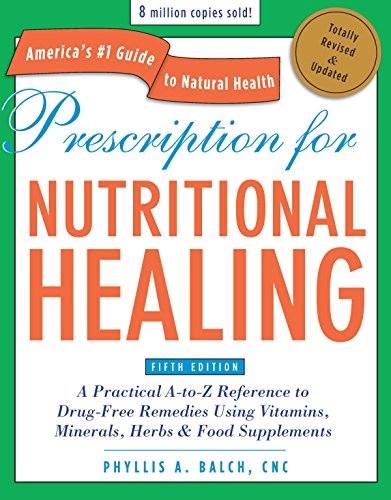
The Prescription for Nutritional Healing is a comprehensive guidebook that provides readers with valuable information about nutrition and natural remedies. This book is an excellent resource for those who are seeking to improve their overall health and well-being.
The book contains a wealth of information about nutrition and how it affects the body. It includes a detailed list of vitamins, minerals, and other essential nutrients that are necessary for good health. The authors have also included information on how to identify and treat various health conditions using natural remedies.
One of the unique features of this book is the inclusion of a section on alternative therapies. The authors discuss a variety of alternative therapies that can be used to treat common health problems such as headaches, arthritis, and depression. They provide detailed information on the different types of therapies available and how they can be used to promote healing.
In addition to the information on nutrition and natural remedies, the book also includes a section on lifestyle factors that can impact health. The authors discuss the importance of exercise, stress management, and other factors that can contribute to overall well-being.
2. Rosemary Gladstar's Medicinal Herbs: A Beginner's Guide: 33 Healing Herbs To Know, Grow, And Use
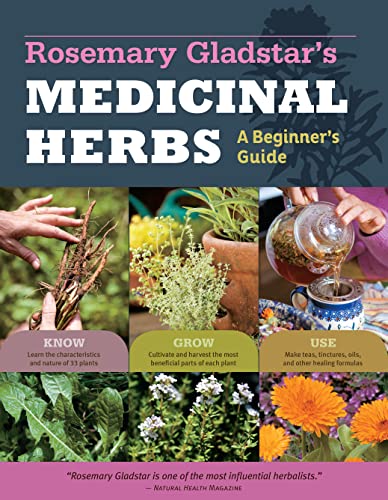
Rosemary Gladstar's Medicinal Herbs: A Beginner's Guide is a comprehensive book that introduces readers to the world of medicinal herbs. With its clear and concise language, this book provides a wealth of information for both novice and experienced herbalists.
The book covers 33 different herbs, each with its own unique healing properties. It includes detailed information on how to grow and harvest these herbs, as well as how to use them to treat a variety of ailments. The author also shares her personal experiences and insights, making this book a valuable resource for anyone interested in natural healing.
One of the key features of this book is its accessibility. The author uses simple language and avoids technical jargon, making it easy for readers to understand and apply the information. The book also includes helpful illustrations and photographs, which further enhance the reader's understanding of the herbs and their uses.
In addition to the individual herb profiles, the book also covers general topics such as herbal preparations, safety considerations, and finding and sourcing high-quality herbs. This makes it a comprehensive guide for anyone interested in using herbal remedies to improve their health and well-being.
Best Herbs For Skin Healing FAQs
Are there any side effects or risks associated with using herbs for skin healing?
While herbs are generally considered safe, there are some risks and side effects associated with using them for skin healing. For instance, some people may experience allergic reactions to certain herbs, which can cause skin irritation, redness, and swelling. Additionally, some herbs may interact with medications or other supplements, leading to adverse effects. It’s also important to note that not all herbs are safe for everyone, especially pregnant women, children, and those with pre-existing medical conditions.
Moreover, some herbs can cause photosensitivity, making the skin more sensitive to sunlight, which can result in sunburns or skin damage. It’s advisable to consult with a healthcare provider or a trained herbalist before using any herbs for skin healing to ensure that they are safe and appropriate for your individual needs. Additionally, it’s crucial to follow the recommended dosage and application instructions carefully to avoid any adverse effects. Overall, while herbs can be a natural and effective way to promote skin healing, it’s essential to use them with caution and under professional guidance.
Are there any specific herbs that are especially beneficial for sensitive or dry skin?
Yes, there are several herbs that are especially beneficial for sensitive or dry skin. Here are some of the most effective ones:
1. Chamomile: Chamomile is a soothing herb that can help calm irritated skin and reduce inflammation. It is also rich in antioxidants that can help protect the skin from damage.
2. Calendula: Calendula is another herb that is known for its anti-inflammatory properties. It can help soothe dry, irritated skin and promote healing.
3. Lavender: Lavender is a versatile herb that has many benefits for the skin. It is soothing, anti-inflammatory, and can help balance oil production in the skin.
4. Aloe Vera: Aloe vera is a succulent plant that is known for its moisturizing and healing properties. It can help soothe dry, sensitive skin and promote healing of damaged skin.
5. Rose: Rose is a gentle herb that is well-suited for sensitive skin. It has anti-inflammatory properties and can help soothe and hydrate dry skin.
Overall, incorporating these herbs into your skincare routine can help improve the health and appearance of sensitive or dry skin.
Can herbs be used in combination with other skincare products or treatments?
Yes, herbs can definitely be used in combination with other skincare products or treatments. In fact, many skincare products and treatments already contain herbs as key ingredients. For example, chamomile is often used in skincare products for its calming and anti-inflammatory properties, while aloe vera is known for its soothing and moisturizing effects.
Using herbs in combination with other products or treatments can enhance the overall effectiveness of your skincare routine. For instance, using a face wash with tea tree oil and then applying a moisturizer with lavender oil can help to both cleanse and soothe the skin.
It's important to note, however, that some herbs may interact with certain medications or other treatments. It's always a good idea to consult with a healthcare professional or skincare specialist before using herbal remedies in combination with other products or treatments. Additionally, it's important to patch test any new products before applying them to your entire face to avoid any potential allergic reactions.
How can I incorporate herbs into my daily skincare routine for optimal skin healing results?
Incorporating herbs into your daily skincare routine can be a great way to enhance your skin's healing and rejuvenating properties. Here are some ways to do it:
1. Infuse herbs into your skincare products: You can infuse herbs into your facial toners, facial mists, and moisturizers. Chamomile, calendula, and lavender are some popular choices for their calming and soothing properties.
2. Make herbal face masks: You can make your own face masks using herbs such as turmeric, rose petals, and neem. These herbs have anti-inflammatory and antibacterial properties that can help with acne and other skin concerns.
3. Use herbal steam: Steaming your face with herbs such as rosemary, thyme, and eucalyptus can help to open up your pores, remove impurities, and stimulate blood circulation.
4. Drink herbal tea: Drinking herbal teas such as green tea, chamomile, and nettle can help to detoxify your body, reduce inflammation, and promote healthy skin from the inside out.
5. Use herbal oils: You can use herbal oils such as jojoba, rosehip, and argan oil as a facial serum or moisturizer. These oils are rich in antioxidants and essential fatty acids that can help to nourish and protect your skin.
Incorporating herbs into your daily skincare routine can provide numerous benefits for your skin. However, it's important to do a patch test first to ensure that your skin doesn't have any adverse reactions.
How do herbs promote skin healing and rejuvenation?
Herbs have been used for centuries for their medicinal properties, including promoting skin healing and rejuvenation. Herbs contain a variety of compounds, such as antioxidants, anti-inflammatory agents, and vitamins, which can help to nourish and protect the skin.
One way that herbs can promote skin healing is by stimulating collagen production. Collagen is a protein that is essential for maintaining the skin's elasticity and strength. Herbs such as aloe vera, lavender, and calendula can help to increase collagen production, which can lead to smoother, more youthful-looking skin.
Another way that herbs can promote skin healing is by reducing inflammation. Inflammation is a natural response of the body to injury or infection, but chronic inflammation can damage the skin and lead to signs of aging. Herbs such as chamomile, turmeric, and ginger have anti-inflammatory properties that can help to reduce redness, swelling, and irritation of the skin.
Finally, herbs can promote skin rejuvenation by providing essential nutrients to the skin. Many herbs contain vitamins and minerals that are important for healthy skin, such as vitamin E, vitamin C, and zinc. Herbs such as rosehip, green tea, and ginseng can help to nourish the skin and protect it from damage caused by environmental factors such as pollution and UV radiation.
How long does it take for herbs to improve skin health and appearance?
The time it takes for herbs to improve skin health and appearance can vary depending on several factors. Firstly, the severity of the skin condition or problem being treated plays a role in how long it takes to see results. Mild conditions may show improvement within a few days or weeks, while more severe conditions may require months of consistent use to see noticeable changes.
Another factor to consider is the type of herb being used. Some herbs have more potent and immediate effects on the skin, while others may take longer to show results. It is also important to note that using herbs in combination with other skincare practices, such as a healthy diet and regular exercise, can accelerate the improvement process.
Overall, it is important to be patient and consistent when using herbs for skin health and appearance. While it may take some time to see results, the natural and holistic approach of using herbs can provide long-term benefits for the skin.
What are the best ways to use herbs for skin healing, such as teas, tinctures, or topical applications?
Herbs have been used for centuries for their healing properties, and they can be particularly effective when it comes to skin healing. There are several ways to use herbs for skin healing, including teas, tinctures, and topical applications.
Teas are a simple and effective way to use herbs for skin healing. Simply steep the herbs in hot water and drink the tea or use it as a rinse for the affected area. Chamomile, calendula, and lavender are all popular choices for skin healing teas.
Tinctures are concentrated herbal extracts that can be taken orally or applied topically to the skin. They are made by soaking herbs in alcohol or glycerin to extract the active compounds. Tinctures can be particularly effective for treating skin conditions such as eczema, psoriasis, and acne.
Topical applications such as creams, salves, and poultices can also be effective for skin healing. These preparations can be made by combining herbs with carrier oils, such as coconut or olive oil, and beeswax to create a healing salve. Calendula, comfrey, and aloe vera are all popular herbs for topical preparations.
It's important to note that while herbs can be effective for skin healing, it's always best to consult with a healthcare professional before using any herbal remedies, especially if you have a pre-existing medical condition or are taking medication.
What are the top herbs for skin healing and why?
When it comes to skin healing, certain herbs have been known to provide effective relief for various skin conditions. Here are some of the top herbs for skin healing:
1. Aloe Vera – Aloe vera is a popular herb that is known for its skin-soothing properties. It contains a compound called acemannan that has been shown to help reduce inflammation and promote wound healing.
2. Calendula – Calendula is an herb that has been used for centuries as a natural remedy for skin irritations and wounds. It has anti-inflammatory properties that can help reduce redness and swelling, and it also contains antioxidants that can protect the skin from damage.
3. Chamomile – Chamomile is another herb that is known for its anti-inflammatory properties. It can help soothe irritated skin and reduce redness, and it also has a calming effect on the skin.
4. Lavender – Lavender is an herb that is often used in aromatherapy, but it also has skin-healing properties. It can help soothe irritated skin, reduce inflammation, and promote wound healing.
5. Tea Tree Oil – Tea tree oil is an essential oil that has antibacterial and antifungal properties. It can be used topically to help treat acne, psoriasis, and other skin conditions.
Overall, these herbs can be effective for promoting skin healing and reducing inflammation. However, it's important to consult with a healthcare professional before using any herbal remedies, especially if you have a medical condition or are taking medication.
Which herbs are best for promoting collagen production and reducing the signs of aging?
As we age, our skin loses collagen, which leads to the formation of wrinkles and fine lines. Luckily, there are several herbs that are known to promote collagen production and reduce the signs of aging. One such herb is gotu kola, which has been used for centuries in Ayurvedic medicine for its anti-aging properties. Gotu kola contains compounds that stimulate the production of collagen, which helps to improve skin elasticity and reduce the appearance of wrinkles.
Another herb that is great for promoting collagen production is rosemary. Rosemary has antioxidant properties that protect the skin from free radical damage, which can cause collagen breakdown. Additionally, rosemary contains rosmarinic acid, which has been shown to boost collagen production.
Finally, turmeric is another herb that can help to promote collagen production. Turmeric contains curcumin, which has been shown to stimulate the production of collagen and improve skin elasticity. Additionally, turmeric has anti-inflammatory properties that can help to reduce inflammation and redness in the skin.
Overall, incorporating these herbs into your diet or skincare routine can help to promote collagen production and reduce the signs of aging.
Which herbs are most effective for treating acne and other skin conditions?
There are several herbs that are effective for treating acne and other skin conditions. One of the most popular herbs for treating acne is tea tree oil. It has powerful antibacterial and anti-inflammatory properties that can help reduce acne-causing bacteria and inflammation. Another effective herb is aloe vera, which has soothing and healing properties that can help reduce inflammation and promote skin healing.
Chamomile is also known for its anti-inflammatory properties and can be used to soothe irritated skin. Calendula is another herb that can be effective for treating acne and other skin conditions due to its anti-inflammatory and antimicrobial properties.
In addition to these, other herbs that can be helpful for treating skin conditions include lavender, witch hazel, neem, and turmeric. However, it's important to note that everyone's skin is different, and what works for one person may not work for another. It's always a good idea to consult with a healthcare professional or a licensed herbalist before using any herbs to treat skin conditions.


